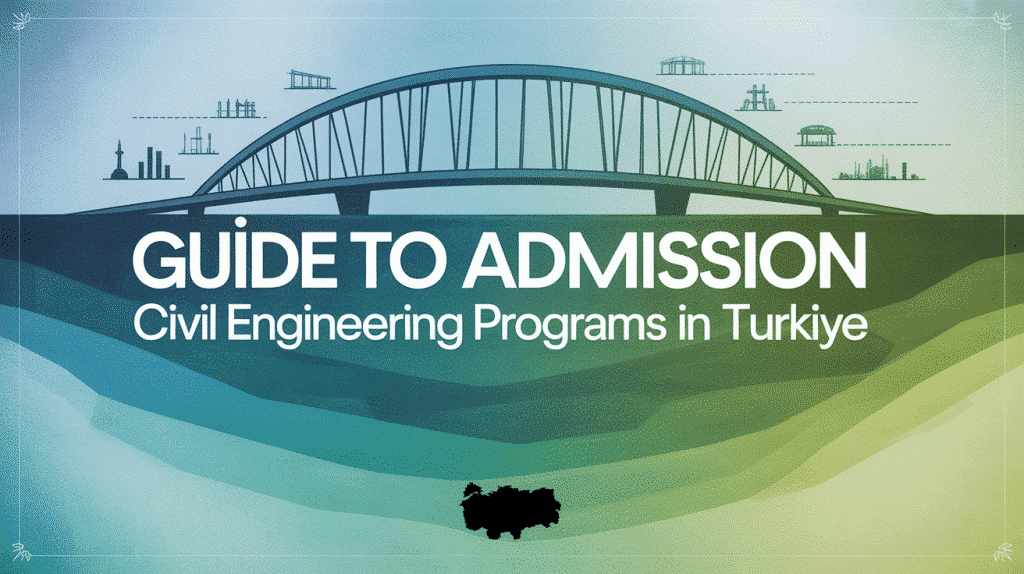Guide to Admission for Civil Engineering Programs in Turkiye
Overview of Civil Engineering in Turkiye
Civil Engineering stands as one of the most esteemed and established engineering disciplines in Turkiye, featuring a diverse array of undergraduate, master’s, and doctoral programs that are offered in both Turkish and English across numerous public and private universities. Degrees from Turkish universities not only enjoy global recognition but also provide international students with substantial educational quality, thereby enhancing their career prospects in engineering.
Undergraduate (Bachelor’s) Admission Requirements
To apply for a bachelor’s degree in Civil Engineering in Turkiye, international students generally need to meet the following requirements:
- High School Diploma: Applicants must possess a completed high school diploma (or equivalent). Most universities require a minimum score of 70% or higher in subjects pertinent to engineering.
- University Entrance Exam: Turkish universities typically necessitate that foreign applicants pass a university entrance exam. The specific exam and scoring requirements may vary across institutions.
- Language Proficiency:
- For programs taught in English: Proof of English proficiency (e.g., TOEFL or IELTS) or a passing score on the university’s own English test is required. However, some universities may permit exemptions for students who have completed their previous education in English.
- For programs offered in Turkish: A certificate of Turkish language proficiency (e.g., TÖMER) must be provided.
- Additional Documentation: Applicants commonly need to submit a passport copy, completed application form, motivation letter, and in some cases, references or portfolios, as required by specific universities.
Duration: The standard duration for a Civil Engineering bachelor’s program is four years. If a preparatory language year is necessary, the total duration may extend to five years.
Postgraduate (Master’s and PhD) Admission Requirements
Master’s in Civil Engineering
- Bachelor’s Degree: Applicants must have earned a bachelor’s degree in Civil Engineering or a closely related field such as Structural, Geotechnical, or Environmental Engineering.
- Academic Transcript: Submission of transcripts displaying completed coursework and GPA is mandatory.
- Language Proficiency:
- For Turkish-medium programs: Turkish language proficiency certificate (e.g., TÖMER) is required.
- For English-medium programs: Proof of English proficiency (e.g., TOEFL, IELTS, or the university’s own test) must be provided.
- Statement of Purpose: Candidates must submit a personal statement outlining their academic interests, career objectives, and reasons for pursuing the program.
- CV/Resume: A detailed CV that includes academic qualifications and any work or internship experience in Civil Engineering is necessary.
- Reference Letters: Some universities may ask for letters of recommendation.
- Duration: Master’s programs typically last for two years.
PhD in Civil Engineering
- Master’s Degree: Applicants are required to hold both a bachelor’s degree and a master’s degree in Civil Engineering or a related field.
- Research Proposal: Many universities request a research proposal detailing the intended doctoral research.
- Other Requirements: Additional requirements could include an interview, letters of reference, and proof of language proficiency.
- Duration: The PhD program usually spans four years.
Civil Engineering Curriculum Highlights
The curriculum for Civil Engineering usually unfolds as follows:
Foundational Years
- Technical Drawing
- Statistics
- Geometry
Specialized Focus
Later years delve into specialized topics including:
- Hydraulics
- Structural Analysis
- Engineering Materials
- Highway Engineering
Students also have the opportunity to specialize in areas such as:
- Infrastructure
- Environmental Engineering
- Geotechnical Engineering
- Structural Engineering
- Water Resources
Notable Universities Offering Civil Engineering
Several universities in Turkiye are well-regarded for their Civil Engineering programs, including:
Application Tips
- Start Early: Initiate the application process well in advance to accommodate processing times.
- Complete Documentation: Ensure that all required documents are completed accurately.
- Research Each University: Verify each university’s specific requirements, as these can vary widely.
Cost of Studying
Tuition fees for Civil Engineering programs in Turkiye vary significantly depending on whether the institution is public or private. Generally, public universities present lower tuition rates compared to their private counterparts.
Take the Next Step with Study in Turkiye
Explore further opportunities for your civil engineering education in Turkiye. We at Study in Turkiye are here to guide you every step of the way.

